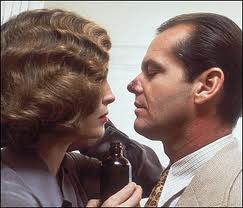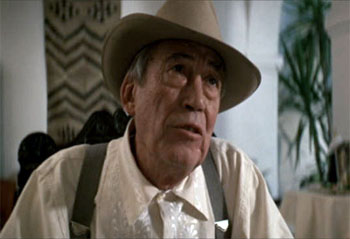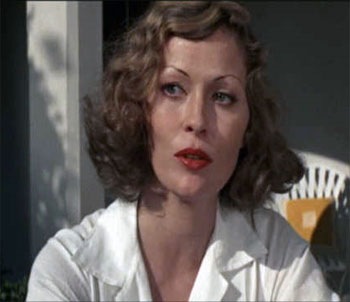Chinatown (Dir. Roman Polanski, 1974):
Chinatown opens with photos of a tawdry wife getting it on with an adulterer in the bushes, the visual equivalent of a dirty joke. By the time it ends, the film is as dirty as anything, and anything but a joke. Like the ’40s detective films it takes its cues from, Chinatown is about hard-boiled dicks, glamored-up dolls, murder and deception, but strip the genre trappings away and you run smack into the downbeat paranoia that characterizes ’70s cinema: conspiracies rule the day, and the object isn’t winning as much as keeping your head above the muck.
 But back to the opening photos, which serve as both a statement of intent and a gambit: in their frankness they go beyond what was permissible onscreen in the golden age of noir, yet they suggest that we’re still playing by the rules of detective cinema — evildoers will be exposed, and truth will eventually be rendered crystal-clear. Or at least it seems that way to J.J. Gittes (Jack Nicholson), the private eye who took the photos. Purring at his clients, leaving the legwork to his two dimwitted assistants (Bruce Glover and Joe Mantell), almost dandy in his fashion sense, Gittes is a man on the make, even though it’s clear he’s not a long way off from his crass origins as a beat cop — to emphasize the point, he tells a dirty joke with all the breathless abandon of a ten-year-old. Soon he’s capturing what appears to be a tryst between the Commissioner of L.A.’s Water and Power and a sweet young thing on his camera, only this time the truth is far more elusive than what’s represented on the negative, and as we follow the story entirely through Gittes’ eyes, the very idea of “seeing” the truth gets more treacherous and unreliable. It’s not a coincidence that camera lens, mirrors and shattered glasses and headlights all figure into the narrative at key points.
But back to the opening photos, which serve as both a statement of intent and a gambit: in their frankness they go beyond what was permissible onscreen in the golden age of noir, yet they suggest that we’re still playing by the rules of detective cinema — evildoers will be exposed, and truth will eventually be rendered crystal-clear. Or at least it seems that way to J.J. Gittes (Jack Nicholson), the private eye who took the photos. Purring at his clients, leaving the legwork to his two dimwitted assistants (Bruce Glover and Joe Mantell), almost dandy in his fashion sense, Gittes is a man on the make, even though it’s clear he’s not a long way off from his crass origins as a beat cop — to emphasize the point, he tells a dirty joke with all the breathless abandon of a ten-year-old. Soon he’s capturing what appears to be a tryst between the Commissioner of L.A.’s Water and Power and a sweet young thing on his camera, only this time the truth is far more elusive than what’s represented on the negative, and as we follow the story entirely through Gittes’ eyes, the very idea of “seeing” the truth gets more treacherous and unreliable. It’s not a coincidence that camera lens, mirrors and shattered glasses and headlights all figure into the narrative at key points.
What the truth reveals is a world out of joint, where the darkest crimes are perpetrated in broad daylight, where a father sleeps with his daughter, where a water commissioner is drowned at the height of a drought. Gittes’ investigation of that death drives the film, and while that particular mystery is ultimately solved, the real point of Chinatown is the pervasive evil that Gittes discovers underneath mounds of intersecting crimes, with Los Angeles’s very future left in the hands of robber barons and entrepreneurs. It could all easily tip over into hysteria, but director Roman Polanski, who lost his parents in the Holocaust and was only five years removed from the horrific death of his wife Sharon Tate at the hands of the Manson family, knows the taste of tragedy all too well. Chinatown is among the sunniest of all noirs — virtually the entire film takes place in glorious Southern California daytime, save the climactic showdown in C-town (John Alonzo’s cinematography is gritty and glamorous in equal measure) — but in its calculated (some might say glacial) pacing and tone, it’s also among the chilliest, like an apocalypse told in retrospect, from the point of view of a shell-shocked survivor.
Cool it may be, but inert the film is not: when violence happens in Chinatown, it’s unexpected, swift and ugly, as when our nosy hero gets his nose sliced up, or when he’s assaulted by irate orange farmers. And if you’re talking heat, there’s Evelyn Mulwray (Faye Dunaway), the water commissioner’s widow, a dame with a flaw in her iris (another comment on imperfect vision) and an unconvincing way of lying. Dunaway plays the ambivalence of her character for all it’s worth: as noir fans we’re conditioned to believe that she’s the femme fatale behind it all, but in a neat twist — Robert Towne’s script is full of ’em — she becomes an un-Holy Mary who is more of a victim than anyone else in the picture. Nicholson may be the film’s anchor (and it’s a pleasure to watch him at the height of his powers, before the ham and the cliches of his later work), but Dunaway is the film’s soul: cool, alluring, flustered, hysterical, and ultimately despairing. The push-pull of her shifting moods is reinforced by Jerry Goldsmith’s score, as langorous trumpet ballads are interrupted by atonal crashes of piano.
“Down these mean streets a man must go who is not himself mean, who is neither tarnished nor afraid. The detective must be a complete man and a common man and yet an unusual man. He must be, to use a rather weathered phrase, a man of honor. He talks as the man of his age talks, that is, with rude wit, a lively sense of the grotesque, a disgust for sham, and a contempt for pettiness.”
— Raymond Chandler
 No great mystery would be complete without a great villain, and while John Huston’s screentime as Noah Cross, Evelyn’s father, is restricted to under fifteen minutes, he leaves enough of an impression to gain mention among the best cinematic baddies: affable, a bit addled (he mistakenly addresses Gittes as “Mr. Gits” numerous times), and unmistakeably used to getting what he wants, he’s the archetype of conniving murderer as magnate. This is a creature who’s sly enough with the big picture to bilk L.A.’s citizens out of their water, and voracious enough in his personal appetites to do “just about anything,” and Huston plays him to the hilt, no doubt basing his portrayal on a few Hollywood execs he’d butted heads with over the years.
No great mystery would be complete without a great villain, and while John Huston’s screentime as Noah Cross, Evelyn’s father, is restricted to under fifteen minutes, he leaves enough of an impression to gain mention among the best cinematic baddies: affable, a bit addled (he mistakenly addresses Gittes as “Mr. Gits” numerous times), and unmistakeably used to getting what he wants, he’s the archetype of conniving murderer as magnate. This is a creature who’s sly enough with the big picture to bilk L.A.’s citizens out of their water, and voracious enough in his personal appetites to do “just about anything,” and Huston plays him to the hilt, no doubt basing his portrayal on a few Hollywood execs he’d butted heads with over the years.
Chinatown culminates in a clash between the private eye and the millionaire over Evelyn’s life, and in the spring-loaded world of Polanski and the ’70s, the result is never in doubt. Towne, ever the romantic (watch his underrated Tequila Sunrise for proof), wanted a happy conclusion, like those old potboilers of yore; Polanski, ever the tragic artist, disagreed, and it was the right decision. Gittes is modeled on Raymond Chandler’s Philip Marlowe, and the movie paints him as a Marlowe divested of illusions, save the biggest one of all — that the world deserves to be set right. Cynical and hard-bitten this hero may be, but as with Robert Altman’s Marlowe in The Long Goodbye, he is hopelessly naive and inadequate when it comes to taking on the evils of a world obsessed with profit motives. “What do you get that you don’t have now?” Gittes asks Cross, and Cross, flummoxed, booms back, “The future, Mr. Gits! the future!” Chinatown wants to have its cake and eat it too, luxuriating in the tropes of vintage detective fiction even as they’re wiped off the map by the more banal villainy of big money and big business, and damned if Polanski doesn’t pull it off. As Gittes is left utterly defeated and stranded by film’s end with an epitaph as memorable as any ever uttered (“Forget it Jake, it’s Chinatown”), we’re left with the realization that we’ve just watched the ultimate, and last, noir film.


